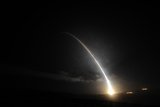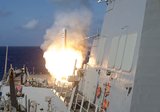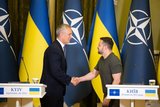US envoy Pompeo tackles NATO on spending
US President Donald Trump's brand new Secretary of State Mike Pompeo came to NATO on 27 April to hammer home one of his boss's oldest themes - demanding that other members pay their way - as the allies sought a common front against Russia.
There was broad agreement in Brussels on the need find ways to counter Russia's adoption of ‘hybrid warfare’ techniques, including subversion, propaganda, cyber warfare, to undermine the West without triggering a full NATO military response.
However, divides remain on spending commitments, with Germany in particular holding out against the large military spending increases demanded by Trump, and on how to balance a stern response to Moscow with keeping open a door to dialogue.
Welcoming former CIA chief Pompeo to the NATO headquarters less than 24 hours after the top US diplomat was sworn in, NATO Secretary General Jens Stoltenberg spoke of the need to adapt the 29-member Western alliance ‘to a more demanding security environment.’
Noting that the talks were the first NATO ministerial meeting since Russian agents allegedly used a nerve agent to poison a double agent in the English town of Salisbury, Britain's Foreign Secretary Boris Johnson summarized the dilemma.
‘How do you deal with a military environment in which attacks come below the threshold of the Article 5 commitment to mutual support but do demand a common response?’ he asked.
The ministers met first at a breakfast to discuss the Russian threat, and Pompeo's US delegation came out satisfied.
‘There was consensus on Russian aggression, the scale of Russian aggression and this being a problem that requires a response,’ a senior State Department official told reporters after the session.
But Pompeo's second message, on the need for other member states to increase their military spending and thus reduce the burden placed on the alliance's biggest member, will not win unanimous support.
Some allies, most notably wealthy Germany, are reluctant to meet a commitment made at a NATO summit in Wales in September 2014 to spend at least 2% of their GDP on defence.
Trump has repeatedly declared this to be tantamount to countries not paying their dues, and Pompeo carried this message to Brussels as his predecessor Rex Tillerson had done.
But, as he arrived, Germany's new Foreign Minister Heiko Maas stressed the contribution Berlin was making to humanitarian work in Syria and to Iraq.
‘Germany plays a very important role,’ Maas said.
The 27 April talks of the 29 foreign ministers, and a defence ministers' meeting in May, prepare the way for a summit in July that could see the US clash with Germany and others.
Before the talks began, US diplomats had singled out Germany, which spends only 1.24% of its large GDP on defence, for criticism.
After the first session, the US official was more guarded. ‘There was a consensus by all countries to deliver their plans, including those who have not yet done so,’ he said.
As the ministers meet in Brussels, German Chancellor Angela Merkel will be in Washington for a much-anticipated meeting with Trump, hard on the heels of French President Emmanuel Macron's triumphant three-day state visit.
France and Britain took part in a recent US-led punishment strike against Syrian President Bashar al-Assad's chemical arsenal, but Germany has not joined recent missions and Merkel's meeting will be less warm than Macron's.
Russia, NATO's traditional foe, was again top of the agenda at 27 April meeting, the last before the alliance leaves its Cold War-era headquarters for new premises.
NATO ministers will look at what more they can do to counter the Russian threat, but Stoltenberg said the alliance remained open to ‘meaningful dialogue’ with Moscow.
Some NATO members are fearful that Pompeo's reputation for confrontation could upend the alliance's dual-track policy on Russia, which combines military deterrence with diplomacy.
Stoltenberg is expected to say a few words to mark the end of the final meeting of ministers in the historic North Atlantic Council room where Article 5, the alliance's mutual self-defence pact, was invoked for the first and only time, after the September 11, 2001 attacks in the US.
Ministers will also debate plans to expand NATO's training mission in Iraq. Details will be confirmed at the summit in July, but Stoltenberg said it would involve several hundred personnel.
After his time in Brussels, Pompeo will head to the Middle East, with stops in Israel, Jordan and Saudi Arabia -- countries chosen to reflect what his spokeswoman called ‘importance as key allies and partners in the region’.
More from Defence Notes
-
![US lawmakers warn that “more military spending is absolutely necessary” to ensure Pentagon’s readiness]()
US lawmakers warn that “more military spending is absolutely necessary” to ensure Pentagon’s readiness
The US Congress has raised concerns about how inflation rates and cuts in main acquisition programmes could affect the US military.
-
![US FY2024 funding package passes as China closes military capability gap]()
US FY2024 funding package passes as China closes military capability gap
The Pentagon has been operating under temporary funding since October 2023, which has impacted its main acquisition and development programmes, increasing the capability gap between the US and China.
-
![NATO outlines future challenges as Ukrainian funding from US stalls]()
NATO outlines future challenges as Ukrainian funding from US stalls
In 2023, defence spending increased by an unprecedented 11% across European NATO countries and Canada. Since 2014, the group has spent an additional US$600 billion on defence.
-
![US Pentagon to reduce investments in main acquisition programmes over FY2025]()
US Pentagon to reduce investments in main acquisition programmes over FY2025
The DoD requested nearly US$850 billion to fund operations over the next fiscal year. Despite the amount being 1% higher than the FY2024 budget request, it has not covered the 3% inflation rate, which could impact the DoD’s main programmes in the medium and long term.
-
![Haiti crisis forces Caribbean militaries to prepare for intervention]()
Haiti crisis forces Caribbean militaries to prepare for intervention
As gangs gain control of Port-au-Prince, Haiti’s Caribbean neighbours have been preparing to intervene in the failed state, with the US and other partners waiting in the wings with equipment and financial support.






















